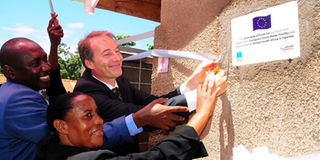Prime
Shs749m water and sanitation project commissioned in Kawempe

European Union, head of delegation, Kristian Schmidt (R), Amref Health Africa in Uganda, country director, Mr. Abenet Leykun (L) and Kawempe Deputy Mayor at the commissioning of water and project in Kawempe.
PHOTO. STEPHEN WANDERA
KAMPALA. To reduce the burden of sanitation related disease in poor peri-Urban and urban communities of Uganda, Amref Health Africa in Uganda and European Union have constructed water tanks and toilets.
“I am happy that today we are here to witness the official symbolic handover and commemoration of the 22 sanitation facilities and 20 ferro-cement rainwater harvesting tanks. These facilities worth Shs749, 555,105 have been constructed in 22 primary schools and communities. Having safe and sustainable sanitation facilities not only drastically reduces the burden of diarrheal disease and related health care costs; it also increases school attendance, especially for girls. It also saves time, and increases productivity,” Health Minister Dr. Elioda Tumwesigye said.
In a speech read for him at the commissioning of sanitation facilities at Emit Emito Primary School on Tuesday, Tumwesigye said installing simple water supply facilities in communities and schools boost the health of the locals.
The intervention under a five year project dubbed “basic sanitation for urban and peri urban poor communities’ project” (2013-2017) is implemented in four locations of Kawempe Division in Kampala; Gulu, Pader and Kitgum districts.
“The 22 latrine blocks handed over to the school, once are all in use will provide access to improved sanitation to 9,602 children, bringing down the pupil- stance ration to an average of 1: 56 from 1: 85,” reads a press statement from Amref.
During the commissioning, EU head of delegation in Uganda, H.E Ambassador Kristian Schmidt lauded Amref Health Africa for this initiative and requested government to invest more in health development to prevent disease due to poor hygiene and sanitation.
“These examples indicate, your individual commitment on issues relating to water, Sanitation and hygiene may significantly contribute to the achievement of other MDGs (Millennium Development Goals) as well,” Tumwesigye said.
We all have a role to play, partners like Amref Health Africa, academicians, civil servants, media professionals, donors, young people, the business community, Tumwesigye noted. Adding, “All of us are leaders in this great movement on sanitation and hygiene. Each of you are here because you want to end open defecation, achieve sanitation and water for all and make Uganda a wealthier, healthier and cleaner place for your children and grandchildren.”
Amref Health Africa in Uganda, country director, Mr. Abenet Leykun said the NGO will continue improve water and sanitation to achieve lasting health change in communities, especially those who are poor and marginalized.
“In Uganda access to hand washing facilities is at 32.7 percent in rural areas and 35 percent in urban areas. This takes a huge toll on health and wellbeing of our people and becomes a huge financial cost including a sizable loss of economic activity,” he said.
In Kampala, we have previously implemented a number of projects since 1980’s the most recent being the Kawempe division, Gulu, Pader, and Kitgum funded by European Union, Leykun noted. Adding, “The health of mothers and children is especially important to Amref Health Africa as we move towards the 2015 deadline for the Millennium Development Goals.”
He said, “Amref Health Africa believes that with the generous support of European Union under this project, and guidance from the health and other government agencies and other stakeholders, we shall continue to successfully deliver to the reduction in morbidity and mortality from water, sanitation and hygiene related diseases.”
European Union, head of delegation, Kristian Schmidt hailed the NGO for implementing the project and promised for support.
Amref Health Africa, the largest African led international organisation on the continent, provides training and health services to over 30 countries in Africa. Founded in 1957 as the Flying Doctors of East Africa to bring critical health services to remote communities, Amref Health Africa now delivers preventative, community-based health care. With a focus on women and children, Amref Health Africa manages a full range of medical and public health programmes tackling the most critical health challenges facing the continent: maternal and child care, HIV & TB, malaria, clean water and sanitation and surgical and clinical outreach.
“Much of our credibility with local communities and African governments stems from the relationship and trust that we have built over the past 57 years. Since inception, Amref Health Africa has trained over 600,000 health workers,” said Leykun.
Amref Health Africa has been working in Uganda since the mid-1980s and was registered as an NGO in 1987. Since then, Amref Health Africa in Uganda has expanded its activities from service delivery to a focus on capacity building, operations research and advocacy. Amref Health Africa in Uganda programme areas of emphasis include, HIV and other sexually transmitted infections (STIs), tuberculosis (TB), adolescent sexual and reproductive health (ASRH), immunization, laboratory services and training programs for health care workers.



